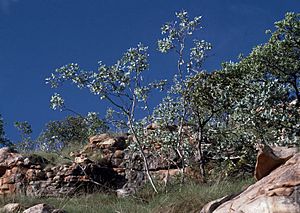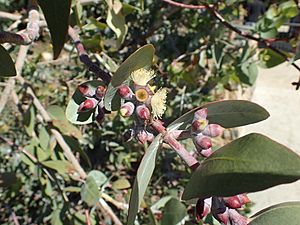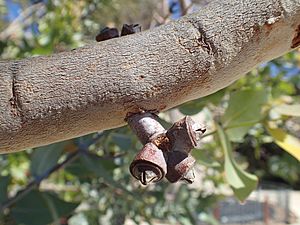Moore's gum facts for kids
Quick facts for kids Mountain white gum |
|
|---|---|
 |
|
| Eucalyptus mooreana near Fern Creek on the Gibb River Road | |
| Conservation status | |
| Scientific classification |
|
| Kingdom: | Plantae |
| Clade: | Tracheophytes |
| Clade: | Angiosperms |
| Clade: | Eudicots |
| Clade: | Rosids |
| Order: | Myrtales |
| Family: | Myrtaceae |
| Genus: | Eucalyptus |
| Species: |
E. mooreana
|
| Binomial name | |
| Eucalyptus mooreana W.Fitzg.
|
|
| Script error: The function "autoWithCaption" does not exist. | |
Script error: No such module "Check for conflicting parameters".
The Eucalyptus mooreana, also known as Moore's gum or mountain white gum, is a special kind of tree or shrub. It's found only in the Kimberley area of Western Australia. This plant is often a bit short and bushy, growing like a "mallee." A mallee is a type of eucalyptus that has many stems growing from a large underground root.
This plant has smooth, white bark that feels powdery. Its leaves are unique because they are young leaves that hug the stem. Its flowers are white, and its fruit looks like a small cup.
Contents
What Does the Mountain White Gum Look Like?
The Mountain White Gum is a straggly tree or mallee. It usually grows to be about 2.5 to 9 meters (8 to 30 feet) tall. Often, its main trunk is a bit crooked.
Its bark is smooth and white, like powder. Each year, this bark peels off, showing new bark that is a pale pink color. The small branches of the tree have a dull, grayish-green or bluish-white coating, which is called "glaucous."
Leaves of the Mountain White Gum
The leaves at the top of the tree are young leaves. They don't have a stalk and wrap around the stem. These leaves are usually oval, heart-shaped, or almost round. Sometimes, they can be lance-shaped.
They are about 6 to 13 millimeters (0.2 to 0.5 inches) long and 3 to 8 millimeters (0.1 to 0.3 inches) wide. They grow in pairs, directly opposite each other on the stem. Both sides of the leaves are the same dull grayish-green or glaucous color.
Flowers and Fruit
The flower buds grow in groups of seven where the leaves meet the stem. They are on a single stem called a "peduncle," which is 7 to 18 millimeters (0.3 to 0.7 inches) long. Each individual bud usually sits directly on this stem without its own stalk.
When the buds are ready, they are oval or diamond-shaped. They are about 10 to 12 millimeters (0.4 to 0.5 inches) long and 5 to 7 millimeters (0.2 to 0.3 inches) wide. They can be red or maroon and have a glaucous coating. The top part of the bud, which covers the flower, is shaped like a cone. This part is called the "operculum."
The Mountain White Gum flowers between May and August. Its flowers are a creamy white color. After flowering, the plant produces a woody fruit. This fruit is a "capsule," which means it's a dry fruit that opens to release seeds. It's shaped like a cup or half a sphere, about 6 to 8 millimeters (0.2 to 0.3 inches) long and wide. The parts that release the seeds stick out above the rim of the fruit.
How it's Different from Similar Plants
The Mountain White Gum looks a lot like two other types of eucalyptus: the Kalumburu Gum (E. herbertiana) and the Halls Creek White Gum (E. cupularis). However, you can tell the Mountain White Gum apart by its unique crown of young, stem-clasping leaves.
How the Mountain White Gum Got Its Name
The Eucalyptus mooreana was first officially described by a botanist named William Vincent Fitzgerald. He wrote about it in "The Western Mail" newspaper on June 2, 1906.
The second part of its scientific name, mooreana, was chosen to honor Newton Moore. He was the Minister of Lands at the time. Another botanist, Joseph Maiden, also described the species later, but Fitzgerald's original description from 1906 is the one that is officially accepted today.
Where the Mountain White Gum Lives
The Mountain White Gum is found in a small part of the Kimberley region in Western Australia. It likes to grow on steep, rocky slopes and mountain tops. You can find it in red sandy soils that are on top of sandstone or quartzite rocks. It grows in the Wunaamin Miliwundi Ranges.
This plant lives in six separate groups of plants. Five of these groups are in special areas protected for nature. One group is on a "pastoral lease," which is land used for grazing animals like cattle. All these groups together cover about 295 square kilometers (114 square miles). One of the groups has about 150 individual plants, but the other groups haven't been counted yet.
You can find this tree at high places, like the top of Mount Broome (about 933 meters or 3,060 feet high), Bold Bluff (about 841 meters or 2,760 feet high), and Mount Leake (about 685 meters or 2,246 feet high).
Protecting the Mountain White Gum
In 2008, the Australian government listed the Mountain White Gum as "vulnerable." This means it's at risk of becoming extinct if we don't protect it. The Department of Environment and Conservation (Western Australia) also calls it "Threatened Flora." This means it's rare or needs special protection to survive.
The biggest dangers to the Mountain White Gum are fires and cattle eating the plants. Efforts are being made to protect these special trees so they can continue to grow in the Kimberley region.
 | Stephanie Wilson |
 | Charles Bolden |
 | Ronald McNair |
 | Frederick D. Gregory |




